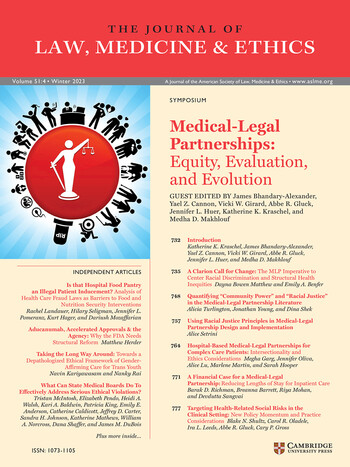New Journal Issue Examines Medical-Legal Partnerships

A first-of-its kind academic collaboration between lawyers and doctors at Yale and beyond has produced the latest issue of The Journal of Law, Medicine, and Ethics (JLME), titled “Medical-Legal Partnerships: Equity, Evaluation, and Evolution.” The volume contains 19 articles exploring cutting-edge questions about structural health inequities, including racial justice, intersectionality, and ethics considerations, as well as policy challenges, such as the establishing the economic benefits of medical-legal partnerships.

The Yale Medical-Legal Partnership (MLP) is the largest academic MLP in the country. The volume arose out of the second national MLP symposium hosted by the Yale MLP last spring, co-hosted with the Georgetown University Health Justice Alliance and Penn State Dickinson Law.
Founded in 2012 by the Solomon Center for Health Law and Policy in collaboration with Yale New Haven Hospital, the Yale MLP embeds attorneys in health care settings, so that lawyers can meet clients where they are, in places they trust, and aim to address their civil legal needs across the spectrum of issues from housing, to guardianship, to benefits, and more. Today, with partners at Yale New Haven Hospital, the Center for Children’s Advocacy, and the Connecticut Veterans Legal Center, the Yale MLP serves nine diverse populations in New Haven, from immigrants, to children, to palliative care patients.
The volume’s contributors include leading MLP practitioners and scholars in law, medicine, and other fields, including leading health equity scholar and Dean of George Washington Law School Dayna Bowen Matthew; Dr. Lisa Puglisi, who directs Yale’s Transitions MLP for individuals returning from incarceration; Dr. Andrew Beck of Cincinnati Children’s Hospital; Professor Barak Richman of Duke Law and Business Schools; and Dr. Bill Sage of Texas A&M Law and Medical Schools.
Some articles in the issue explore MLPs focused on specific populations and health issues, including addiction medicine, palliative care, addressing clients’ criminal legal needs and civil legal needs after incarceration, and reproductive care. Other pieces suggest policy and practice considerations in targeting health-related social risks, aligning MLP services with U.S. health care delivery, health justice, and screening for social determinants of health.
“We are so proud of the work our MLP does on the ground every day, helping to serve some 600 New Haveners a year,” said Yale MLP founding faculty director Abbe R. Gluck ’00, the Alfred M. Rankin Professor of Law at Yale Law School and Faculty Director of the Solomon Center. “Combining our clinical impact with cutting-edge academic scholarship that moves the needle on MLP law and policy has long been a goal of ours, and this volume is a fantastic, ambitious, and comprehensive accomplishment on that front.”
The JLME issue is guest-edited by former Solomon Center Executive Director Katherine K. Kraschel, Yale MLP Legal Director James Bhandary-Alexander, and Gluck, along with Georgetown Law’s Yael Z. Cannon and Vicki W. Girard, Penn State’s Medha D. Makhlouf, and Jennifer L. Huer. As the editors explain in their introduction to the volume, “MLPs have already proved to be a critical intervention in addressing the legal and structural bases of health inequity and injustice; it is up to all stakeholders in the system to chart the success of MLPs’ future.”


